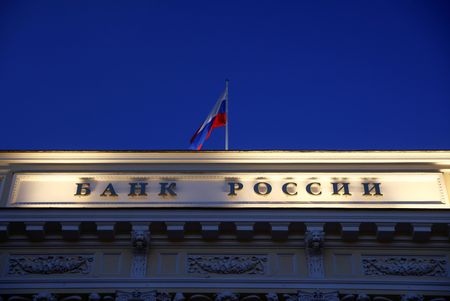LONDON (Reuters) -Russia’s central bank on Friday pledged to keep expanding the number of countries that accept its Mir bank cards after new U.S. sanctions targeting people and entities accused of helping Moscow skirt financial sanctions.
The United States on Thursday sanctioned the chief executive of the Bank of Russia’s National Card Payment System (NSPK), which runs Mir, saying it was seeking to hold the Russian government accountable for its Feb. 24 invasion and continuing war against Ukraine.
“Russia has scrambled to find new ways to process payments and conduct transactions,” the U.S. Treasury said. “Directly and indirectly, Russia’s financial technocrats have supported the Kremlin’s unprovoked war” against Ukraine.
The importance of Mir cards for Russians rose substantially this year after U.S. payments firms Visa Inc and Mastercard Inc suspended operations in Russia and their cards that were issued in Russia stopped working abroad.
Cuba, South Korea, Turkey, Vietnam and a handful of former Soviet republics accept Mir, which means both “peace” and “world” in Russian, with others such as Iran intending to follow suit soon.
NSPK and Mir themselves are not themselves sanctioned, and U.S. analysts said the U.S. move aimed to keep them from being used to evade U.S. sanctions rather than to prevent Russian tourists from paying for their hotel bills abroad.
The central bank said Mir cards and other NSPK services would continue working as usual in Russia.
“Foreign partners themselves take decisions about opening their infrastructure to accept Mir cards,” the central bank said. “At the same time, we intend to continue dialogue about expanding the geography of Mir card acceptance.”
The U.S. Treasury said it had blacklisted 22 individuals, including four financial executives whose actions could support Russia’s war effort by helping it evade financial sanctions imposed on Russia after its invasion of Ukraine.
The four included Vladimir Komlev, the head of NSPK.
“Russia created its own state-run card payment system in 2014 out of fear of U.S. and European sanctions,” the Treasury said. “In his role, Komlev has promoted the Mir network in other countries, which ultimately could assist Russia in circumventing international sanctions.”
The Treasury said “non-U.S. financial institutions that enter into new or expanded agreements with NSPK risk supporting Russia’s efforts to evade U.S. sanctions through the expanded use of the MIR National Payment System outside the territory of the Russian Federation.”
Analysts said this implied that existing, limited agreements with NSPK – such as those allowing Russian tourists to pay their hotel bills abroad – were not likely to violate U.S. sanctions.
“They must have some indication, whether diplomatic or intelligence, that Russia is seeking to connect its domestic payments system internationally for the purpose of sanctions evasion,” said Brian O’Toole, a former Treasury official who is a fellow at the Washington-based Atlantic Council think tank.
“I don’t think the administration particularly cares all that much about Russian tourists visiting Turkey and paying their hotel bills,” he added.
NSPK did not immediately respond to a request for comment.
Moscow says what it calls a “special military operation” in Ukraine was necessary to prevent its neighbour being used as a platform for Western aggression, and to defend Russian-speakers. Kyiv and its Western allies dismiss these arguments as baseless pretexts for an imperial-style war of aggression.
(Reporting by Reuters; Editing by Kevin Liffey and Cynthia Osterman)





